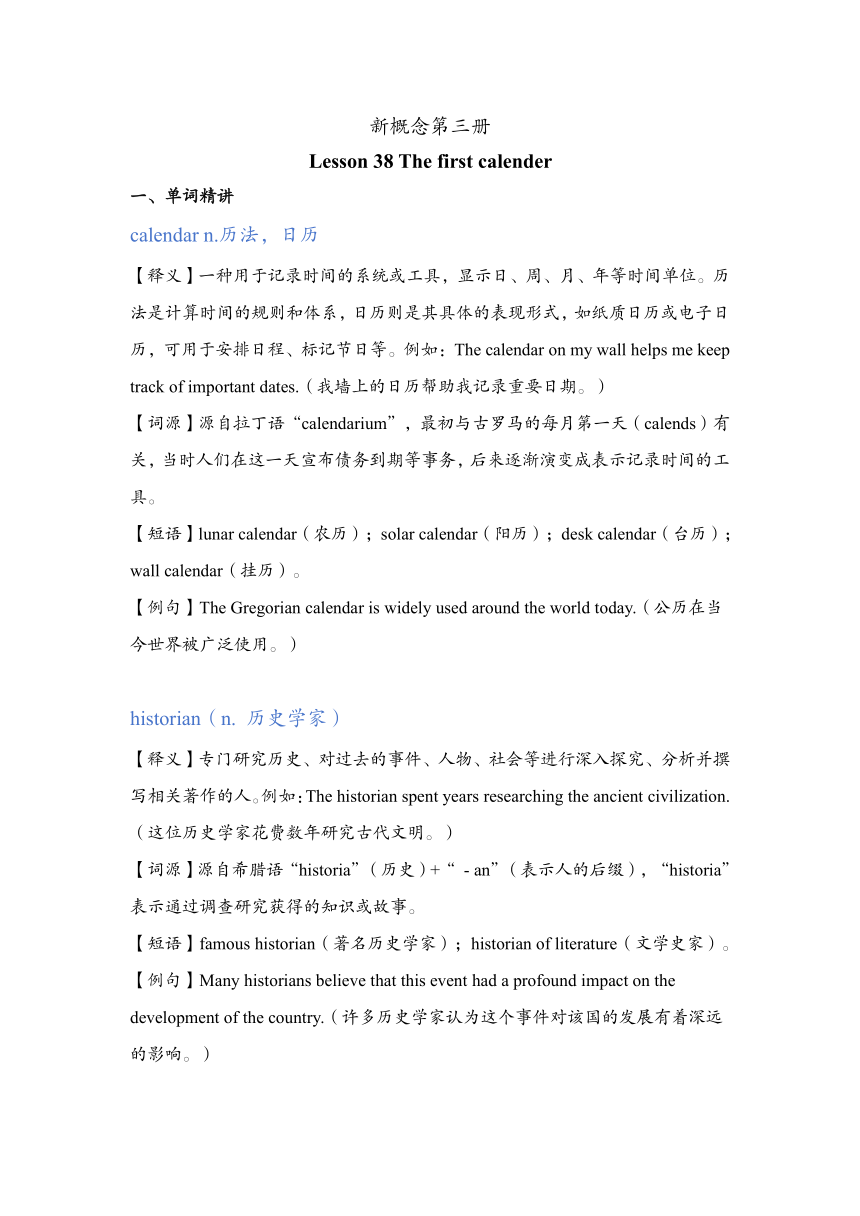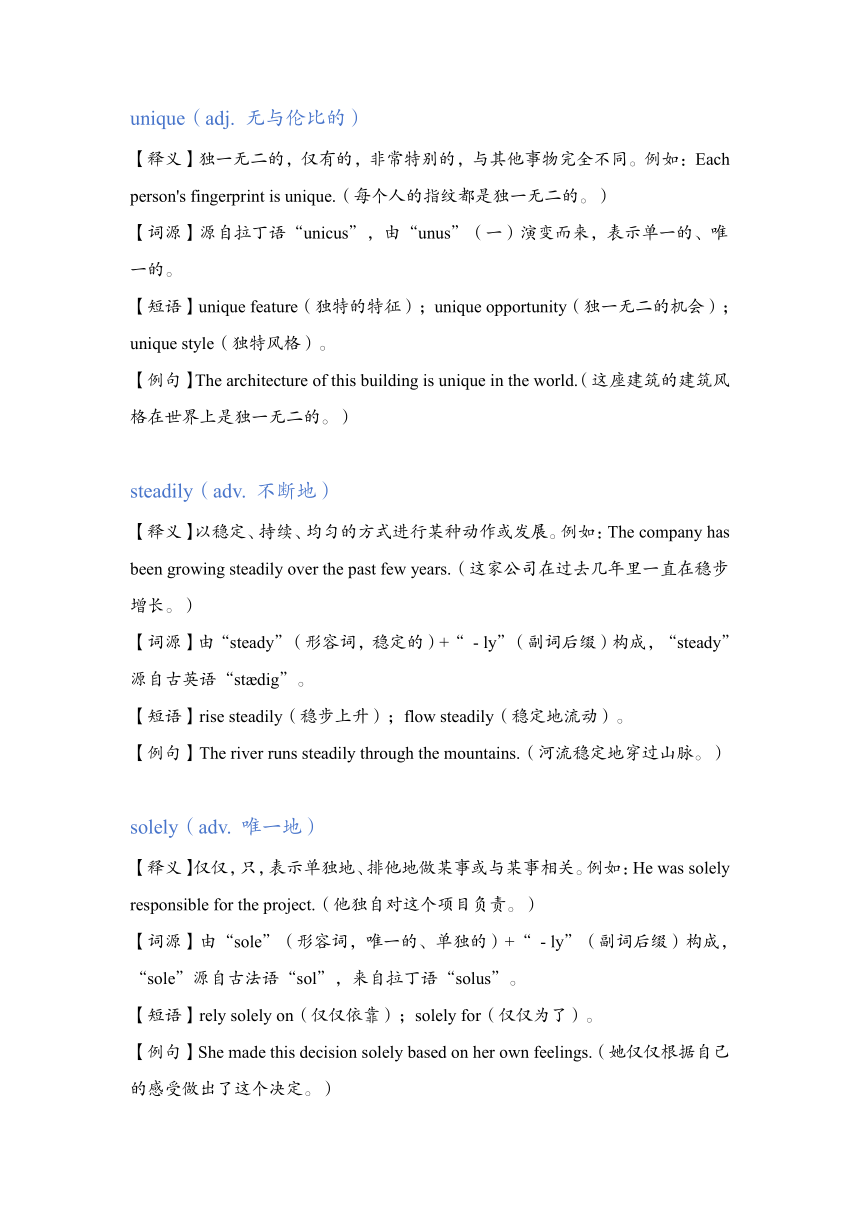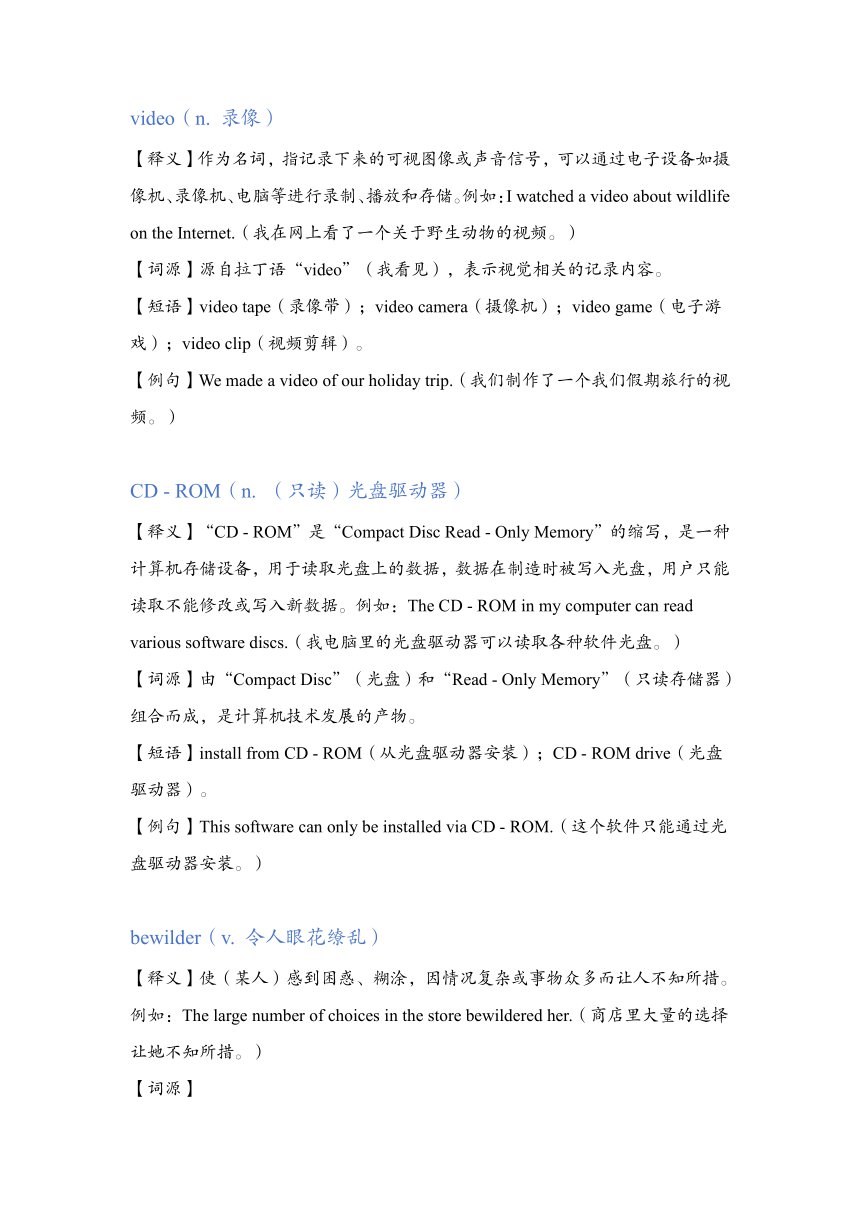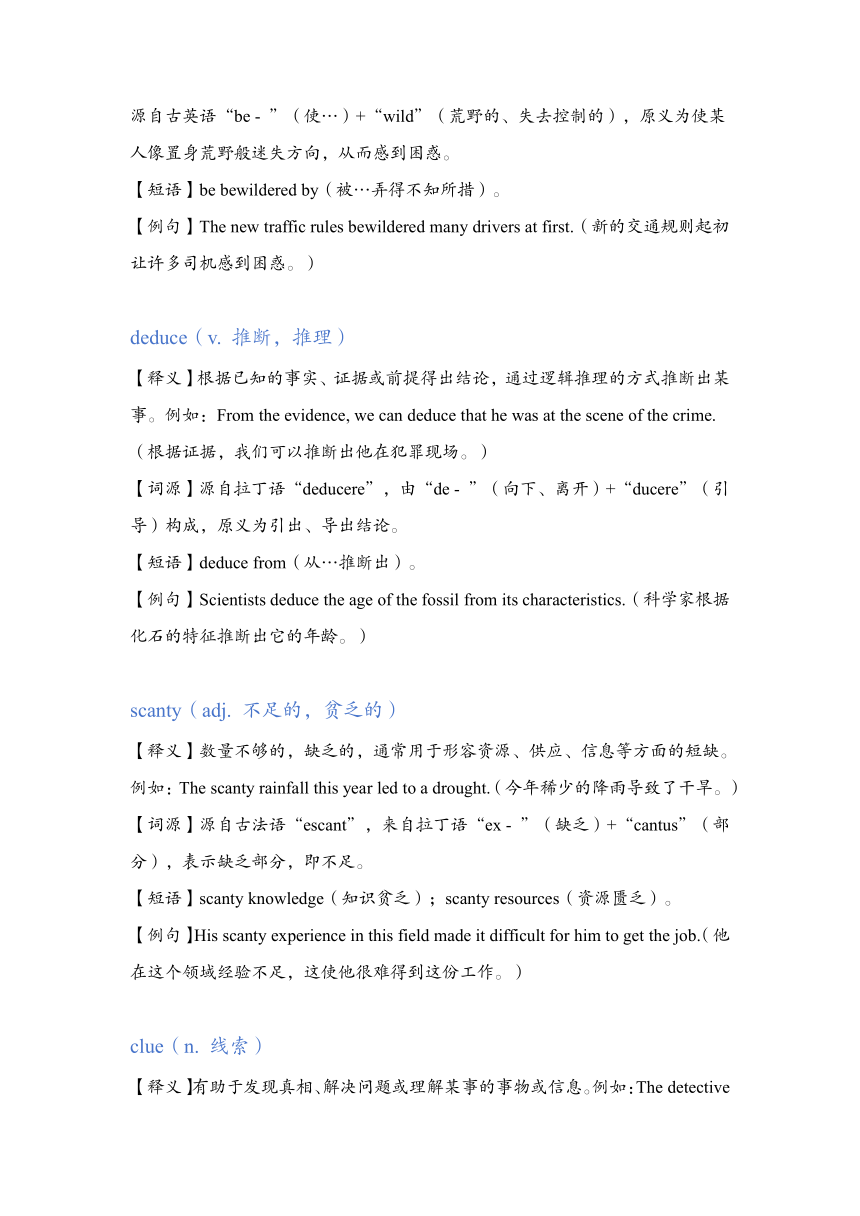新概念第三册Lesson 38 The first calender讲义
文档属性
| 名称 | 新概念第三册Lesson 38 The first calender讲义 |

|
|
| 格式 | docx | ||
| 文件大小 | 427.0KB | ||
| 资源类型 | 教案 | ||
| 版本资源 | 新概念英语 | ||
| 科目 | 英语 | ||
| 更新时间 | 2024-12-05 09:53:38 | ||
图片预览





文档简介
新概念第三册
Lesson 38 The first calender
单词精讲
calendar n.历法,日历
【释义】一种用于记录时间的系统或工具,显示日、周、月、年等时间单位。历法是计算时间的规则和体系,日历则是其具体的表现形式,如纸质日历或电子日历,可用于安排日程、标记节日等。例如:The calendar on my wall helps me keep track of important dates.(我墙上的日历帮助我记录重要日期。)
【词源】源自拉丁语“calendarium”,最初与古罗马的每月第一天(calends)有关,当时人们在这一天宣布债务到期等事务,后来逐渐演变成表示记录时间的工具。
【短语】lunar calendar(农历);solar calendar(阳历);desk calendar(台历);wall calendar(挂历)。
【例句】The Gregorian calendar is widely used around the world today.(公历在当今世界被广泛使用。)
historian(n. 历史学家)
【释义】专门研究历史、对过去的事件、人物、社会等进行深入探究、分析并撰写相关著作的人。例如:The historian spent years researching the ancient civilization.(这位历史学家花费数年研究古代文明。)
【词源】源自希腊语“historia”(历史)+“ - an”(表示人的后缀),“historia”表示通过调查研究获得的知识或故事。
【短语】famous historian(著名历史学家);historian of literature(文学史家)。
【例句】Many historians believe that this event had a profound impact on the development of the country.(许多历史学家认为这个事件对该国的发展有着深远的影响。)
unique(adj. 无与伦比的)
【释义】独一无二的,仅有的,非常特别的,与其他事物完全不同。例如:Each person's fingerprint is unique.(每个人的指纹都是独一无二的。)
【词源】源自拉丁语“unicus”,由“unus”(一)演变而来,表示单一的、唯一的。
【短语】unique feature(独特的特征);unique opportunity(独一无二的机会);unique style(独特风格)。
【例句】The architecture of this building is unique in the world.(这座建筑的建筑风格在世界上是独一无二的。)
steadily(adv. 不断地)
【释义】以稳定、持续、均匀的方式进行某种动作或发展。例如:The company has been growing steadily over the past few years.(这家公司在过去几年里一直在稳步增长。)
【词源】由“steady”(形容词,稳定的)+“ - ly”(副词后缀)构成,“steady”源自古英语“st dig”。
【短语】rise steadily(稳步上升);flow steadily(稳定地流动)。
【例句】The river runs steadily through the mountains.(河流稳定地穿过山脉。)
solely(adv. 唯一地)
【释义】仅仅,只,表示单独地、排他地做某事或与某事相关。例如:He was solely responsible for the project.(他独自对这个项目负责。)
【词源】由“sole”(形容词,唯一的、单独的)+“ - ly”(副词后缀)构成,“sole”源自古法语“sol”,来自拉丁语“solus”。
【短语】rely solely on(仅仅依靠);solely for(仅仅为了)。
【例句】She made this decision solely based on her own feelings.(她仅仅根据自己的感受做出了这个决定。)
video(n. 录像)
【释义】作为名词,指记录下来的可视图像或声音信号,可以通过电子设备如摄像机、录像机、电脑等进行录制、播放和存储。例如:I watched a video about wildlife on the Internet.(我在网上看了一个关于野生动物的视频。)
【词源】源自拉丁语“video”(我看见),表示视觉相关的记录内容。
【短语】video tape(录像带);video camera(摄像机);video game(电子游戏);video clip(视频剪辑)。
【例句】We made a video of our holiday trip.(我们制作了一个我们假期旅行的视频。)
CD - ROM(n. (只读)光盘驱动器)
【释义】“CD - ROM”是“Compact Disc Read - Only Memory”的缩写,是一种计算机存储设备,用于读取光盘上的数据,数据在制造时被写入光盘,用户只能读取不能修改或写入新数据。例如:The CD - ROM in my computer can read various software discs.(我电脑里的光盘驱动器可以读取各种软件光盘。)
【词源】由“Compact Disc”(光盘)和“Read - Only Memory”(只读存储器)组合而成,是计算机技术发展的产物。
【短语】install from CD - ROM(从光盘驱动器安装);CD - ROM drive(光盘驱动器)。
【例句】This software can only be installed via CD - ROM.(这个软件只能通过光盘驱动器安装。)
bewilder(v. 令人眼花缭乱)
【释义】使(某人)感到困惑、糊涂,因情况复杂或事物众多而让人不知所措。例如:The large number of choices in the store bewildered her.(商店里大量的选择让她不知所措。)
【词源】
源自古英语“be - ”(使…)+“wild”(荒野的、失去控制的),原义为使某人像置身荒野般迷失方向,从而感到困惑。
【短语】be bewildered by(被…弄得不知所措)。
【例句】The new traffic rules bewildered many drivers at first.(新的交通规则起初让许多司机感到困惑。)
deduce(v. 推断,推理)
【释义】根据已知的事实、证据或前提得出结论,通过逻辑推理的方式推断出某事。例如:From the evidence, we can deduce that he was at the scene of the crime.(根据证据,我们可以推断出他在犯罪现场。)
【词源】源自拉丁语“deducere”,由“de - ”(向下、离开)+“ducere”(引导)构成,原义为引出、导出结论。
【短语】deduce from(从…推断出)。
【例句】Scientists deduce the age of the fossil from its characteristics.(科学家根据化石的特征推断出它的年龄。)
scanty(adj. 不足的,贫乏的)
【释义】数量不够的,缺乏的,通常用于形容资源、供应、信息等方面的短缺。例如:The scanty rainfall this year led to a drought.(今年稀少的降雨导致了干旱。)
【词源】源自古法语“escant”,来自拉丁语“ex - ”(缺乏)+“cantus”(部分),表示缺乏部分,即不足。
【短语】scanty knowledge(知识贫乏);scanty resources(资源匮乏)。
【例句】His scanty experience in this field made it difficult for him to get the job.(他在这个领域经验不足,这使他很难得到这份工作。)
clue(n. 线索)
【释义】有助于发现真相、解决问题或理解某事的事物或信息。例如:The detective found a crucial clue at the crime scene.(侦探在犯罪现场发现了一条关键线索。)
【词源】源自古英语“clew”,原义为一团线,在神话故事中,线团可用于指引走出迷宫,因此引申为线索。
【短语】give a clue(提供线索);clue to(…的线索)。
【例句】There were no clues as to where he had gone.(没有关于他去向的线索。)
insignificant(adj. 不重要的)
【释义】没有重要意义的,不重要的,微小的,可忽略不计的。例如:This small mistake is insignificant compared to the overall success of the project.(与项目的整体成功相比,这个小错误不重要。)
【词源】由“in - ”(不)+“significant”(重要的)构成,“significant”源自拉丁语“significare”(表示、意味)。
【短语】insignificant amount(微不足道的数量);seem insignificant(似乎不重要)。
【例句】His opinion was considered insignificant in the meeting.(他的意见在会议上被认为不重要。)
shed(v. 使流出,泻)
【释义】使(液体、光线等)流出、散发或脱落(如树叶、毛发等)。例如:Trees shed their leaves in autumn.(树木在秋天落叶。)
也可表示摆脱、去除(如习惯、观念等),例如:He shed his old bad habits.(他改掉了他以前的坏习惯。)
【词源】源自古英语“sceadan”,有分开、分离的含义,后来引申为使液体流出、东西脱落等。
【短语】shed tears(流泪);shed light on(阐明;使…清楚地显出)。
【例句】The lamp shed a warm glow over the room.(灯在房间里洒下温暖的光。)
advent(n. 出现,到来,来临)
【释义】重要人物、事物、事件等的到来、出现或开始。例如:The advent of the Internet has changed our lives in many ways.(互联网的出现从很多方面改变了我们的生活。)
【词源】源自拉丁语“adventus”,由“ad - ”(向、到)+“venire”(来)构成,表示来到、到达。
【短语】the advent of(…的到来)。
【例句】With the advent of spring, the flowers start to bloom.(随着春天的到来,花朵开始盛开。)
agriculture(n. 农业)
【释义】涉及耕种土地、饲养动物等生产食物、纤维和其他农产品的活动和科学。例如:Agriculture is the backbone of many developing countries.(农业是许多发展中国家的支柱。)
【词源】源自拉丁语“agri”(田地)+“cultura”(耕种、培育),表示田地的耕种。
【短语】modern agriculture(现代农业);agriculture industry(农业产业)。
【例句】The government is investing a lot in agriculture to ensure food security.(政府在农业上投入大量资金以确保粮食安全。)
assumption(n. 假定,设想)
【释义】基于不充分证据或未经证实的观点所做出的认为某事为真的假设。例如:His assumption turned out to be wrong.(他的假设结果是错误的。)
【词源】源自拉丁语“assumere”(承担、假定)的过去分词“assumptus”,表示承担一种未经证实的观点。
【短语】make an assumption(做出假设);on the assumption that(假定…)。
【例句】She made an assumption about his intentions without any real evidence.(她在没有任何真凭实据的情况下对他的意图做出了假设。)
dot(n. 小圆点)
【释义】一个小的、圆形的标记或点,可用于书写、印刷、标记等方面。例如:There is a dot above the letter 'i'.(字母“i”上面有一个小圆点。)
【词源】源自古英语“dott”,可能是模仿小点的形状而创造的词。
【短语】dot matrix(点阵);on the dot(准时);dot product(点积,数学术语)。
【例句】
Put a dot here to mark the starting point.(在这里点一个点来标记起点。)
symbol(n. 符号)
【释义】代表某种事物、概念、品质等的标志、记号或象征物。例如:The dove is a symbol of peace.(鸽子是和平的象征。)
【词源】源自希腊语“symbolon”,原义为信物、标志,用于识别身份或表示某种意义。
【短语】national symbol(国家象征);chemical symbol(化学符号);symbol for(…的符号)。
【例句】The red cross is a well - known symbol all over the world.(红十字在全世界是一个著名的符号。)
engrave(v. 雕刻)
【释义】在坚硬的材料(如金属、石头、木材等)上刻字、图案或标记。例如:The artist engraved his name on the statue.(艺术家在雕像上刻下了他的名字。)
【词源】源自法语“engraver”,来自古法语“en - ”(使…进入)+“grave”(刻痕、雕刻),表示使刻痕进入物体。
【短语】engrave with(用…雕刻);engrave on(刻在…上)。
【例句】He engraved a beautiful pattern on the silver plate.(他在银盘上雕刻了一个美丽的图案。)
ivory(n. 象牙制品)
【释义】指大象、海象等动物的长牙或由这些长牙制成的物品。例如:The ivory carving is very delicate.(这个象牙雕刻非常精致。)
【词源】源自古法语“ivurie”,来自拉丁语“ebur”,表示大象的长牙。
【短语】ivory tower(象牙塔,常用来形容脱离现实的学术环境);ivory trade(象牙贸易)。
【例句】In modern times, the ivory trade is strictly prohibited in many countries.(在现代,许多国家严格禁止象牙贸易。)
mammoth(n. (古)长毛象)
【释义】一种已灭绝的大型象类动物,体型巨大,体表覆盖长毛,生活在冰河时期。例如:Scientists study mammoth fossils to learn about prehistoric life.(科学家研究长毛象化石以了解史前生命。)
【词源】源自俄语“mamont”,可能来自于西伯利亚当地的一种语言,最初用来指这种大型的已灭绝的象类动物。
【短语】mammoth skeleton(长毛象骨架);mammoth tusks(长毛象的獠牙)。
【例句】The discovery of the mammoth remains was a great find for archaeologists.(长毛象遗骸的发现对考古学家来说是一个重大发现。)
tusk(n. 獠牙,长牙,象牙)
【释义】某些动物(如大象、野猪等)从嘴中伸出的长长的、弯曲的牙齿,通常用于防御、挖掘或获取食物等。例如:The elephant's tusks are very valuable.(大象的象牙非常珍贵。)
【词源】源自古英语“tux”,可能来自原始日耳曼语,直接表示动物的长牙。
【短语】tusk shell(角贝,一种海洋生物);elephant tusk(象牙)。
【例句】The male walrus has long tusks.(雄性海象有长长的獠牙。)
nomad(n. 游牧民)
【释义】以游牧生活方式为生的人,他们通常随着季节的变化而迁移,寻找牧场和水源来饲养牲畜。例如:The nomads in the desert move from one oasis to another.(沙漠中的游牧民从一个绿洲迁移到另一个绿洲。)
【词源】源自希腊语“nomas”(牧场)+“ - ad”(表示人的后缀),表示与牧场相关的人,即游牧民。
【短语】nomad tribe(游牧部落);nomad life(游牧生活)。
【例句】Nomads have a unique culture based on their mobile lifestyle.(游牧民基于他们的流动生活方式有着独特的文化。)
correlate(v. 使相互联系)
【释义】表明或建立两个或多个事物之间的相互关系或联系。例如:We need to correlate these two sets of data.(我们需要将这两组数据相互联系起来。)
【词源】由“co - ”(共同、一起)+“relate”(联系)构成,表示使共同联系起来。
【短语】correlate with(与…相关联);correlate to(与…相互关联)。
【例句】The researchers found that the patient's symptoms
phase n. 月相,天相
【释义】在天文学中,指月亮(或其他天体)在其轨道上相对于太阳和地球的不同位置所呈现出的外观形态,如新月、满月等月相;也可泛指天体的相位,是描述天体相对位置关系的概念。例如:The different phases of the moon are caused by its position relative to the Earth and the Sun.(月亮的不同月相是由它相对于地球和太阳的位置所引起的。)
【词源】源自希腊语“phasis”,表示外观、现象,最初用于描述月亮的不同外观形态,后来扩展到其他天体的相位概念。
【短语】lunar phase(月相);phase change(相变,物理学术语,也可用于描述天体相位的改变);in phase(同相,物理概念,在天文学中可表示天体处于相同的相位状态)。
【例句】Scientists study the phases of Venus to learn more about its orbit.(科学家研究金星的相位以更多地了解它的轨道。)
primitive(adj. 原始的)
【释义】形容事物处于早期发展阶段的、简单而未发展完善的;也可用于形容人类社会早期的、文化落后的状态或人具有简单质朴的特点。例如:Primitive tools were made from stones and bones.(原始工具是由石头和骨头制成的。)
【词源】源自拉丁语“primitivus”,由“primus”(第一、最初)演变而来,表示最初的、原始的状态。
【短语】primitive society(原始社会);primitive art(原始艺术);primitive instinct(原始本能)。
【例句】The primitive tribes in the jungle still live a very simple life.(丛林中的原始部落仍然过着非常简单的生活。)
depict(v. 描画,描绘)
【释义】用绘画、文字、语言等方式描写或表现人、物、场景或事件等。例如:The artist depicted a beautiful landscape in his painting.(画家在他的画中描绘了一幅美丽的风景。)
【词源】源自拉丁语“depingere”,由“de - ”(向下、彻底)+“pingere”(绘画)构成,原义为彻底地绘画,即描绘。
【短语】depict as(把…描绘成);depict in(用…描绘)。
【例句】The novel depicted the hero as a brave and intelligent man.(这部小说把主人公描绘成一个勇敢而聪明的人。)
二、课文精讲
1.Future historians will be in a unique position when they come to record the history of our own times.
未来的历史学家在写我们这一段历史的时候会别具一格。
when引导时间状语从句,从句中的of our own times充当history的后置定语。
come to do的意思是“要做”。
They will hardly know which facts to select from the great mass of evidence that steadily accumulates.
对于逐渐积累起来的庞大材料,他们几乎不知道选取哪些好。
which引导宾语从句,交代know的内容。That引导定语从句,修饰evidence。
hardly know可直译“几乎不知道”。
What is more, they will not have to rely solely on the written word.
而且,也不必完全依赖文字材料。
what is more为承上启下的过渡语。
rely on的意思是“依靠,依赖”,相当于depend on。
Films, videos. CDs and CD-ROMs are just some of the bewildering amount of information they will have.
电影、录像、光盘和光盘驱动器只是能为他们提供令人眼花缭乱的大量信息的几种手段。
定语从句they will have的前面省去了关系代词that,修饰information。
They will be able, as it were, to see and hear us in action.
他们能够身临其境般地观看我们做事,倾听我们讲话。
as it were作插入语,意思是“可以说”。In action作宾语us的补足语。
But the historian attempting to reconstruct the distant past is always faced with a difficult task.
但是,历史学家企图重现遥远的过去可是一项艰巨的任务。
attempting to reconstruct the distant past为现在分词短语,作后置定语,修饰historian。
be faced with的意思是“面对”,相当于be confronted with。
He has to deduce what he can from the few scanty clues available.
他们必须根据现有的不充分的线索进行推理。
what引导宾语从句,说明deduce的内容。
Even seemingly insignificant remains can shed interesting light on the history of early man.
即使看起来微不足道的遗物,也可能揭示人类早期历史的一些有趣的内容。
shed的本意是“使…流出”,在本句中引申为“揭示”,相当于reveal。
shed light on的意思是“揭示…方面的事情,把…弄清楚”。
Up to now, historians have assumed that calendars came into being with the advent of agriculture, for then man was faced with a real need to understand something about the seasons.
历史学家迄今认为日历是随农业的问世而出现的,因为当时人们面临着了解四季的实际需要。
up to now放在句首,后面谓语的时态一定是现在完成时,这是约定俗成的语法要求。That引导宾语从句,交代assumed的内容。For引导原因状语从句,说明历史学家为什么会这么认为。
come into being是固定搭配,意为“产生,出现”。
10. Recent scientific evidence seems to indicate that this assumption is incorrect.但近期科学研究发现,好像这种假设是不正确的。
that引导宾语从句,交代indicate的内容。
indicate的本意是“指出”,在此引申为“发现”。
Historians have long been puzzled by dots, lines and symbols which have been engraved on walls, bones, and the ivory tusk of mammoths.
长期以来,历史学家一直对雕刻在墙壁上、骨头上、古代长毛象的象牙上的点、线和形形色色的符号感到困惑不解。
这句话的核心结构是sb.be puzzled by sth.(某人对某事感到困惑不解)。Which引导定语从句,修饰dots,lines and symbols。
engrave on的意思是“在…上雕刻”。
The nomads who made these markings lived by hunting and fishing during the last Ice Age, which began about 35,000 B.C. and ended about 10,000 B.C.
这些痕迹是游牧人留下的,他们生活在从公元前约35,000年到公元前10,000年的冰川期的末期,以狩猎、捕鱼为生。
who引导定语从句,修饰nomads。Which引导定语从句,修饰the last Ice Age。
lived by hunting and fishing的意思是“靠狩猎和捕鱼为生”。
By correlating markings made in various parts of the world, historians have been able to read this difficult code.
历史学家通过把世界各地留下的这种痕迹放在一起研究,终于弄懂了这种费解的代码。
by引导方式状语,指“通过…方式”,其中的made in various parts of the world是过去分词短语,作markings的后置定语。
have been able to read不可理解为“已经能够读了”,read在此引申为“弄懂”。
They have found that it is connected with the passage of days and the phases of the moon.
他们发现代码与昼夜更迭和月亮圆缺有关。
that引导宾语从句,交代have found的内容;这个宾语从句中的and连接两个并列的宾语。
sth.be connected with sth.的意思是“某物与某物之间存在联系”。
15.It is, in fact, a primitive type of calendar.事实上是一种最原始的日历。
in fact不仅是插入语,还起强调作用。It指上文中所说的code(代码)。
It has long been known that the hunting scenes depicted on wallswere not simply a form of artistic expression.
大家早就知道,画在墙上的狩猎图景并不是单纯的艺术表现形式。
It has long been known that…是一个固定句式,表示“大家早就知道…”,it充当形式主语,that引导的内容才是真正的主语。
depicted on walls为过去分词短语,作hunting scenes的后置定语。
be not simply a form of的意思是“并不是一种简单的…形式”。
17.They had a definite meaning, for they were as near as early man could get to writing.它们有着一定的含义,因为它们已接近古代人的文字形式。
for引导原因状语从句,交代“有含义”的理由。
they指代上文中所说the hunting scenes depicted on walls。
It is possible that there is a definite relation between these paintings and the markings that sometimes accompany them
有时,这种图画与墙壁上的刻痕共存,它们之间可能有一定的联系。
第一个that引导的部分是真正的主语,it是形式主语,第二个that引导定语从句,修饰markings.
It seems that man was making a real effort to understand the seasons 20,000 years earlier than has been supposed.
看来人类早就致力于探索四季变迁了,比人们想像的要早20,000年。
that引导表语从句;在这个从句中,than引导定语从句,在该定语从句中,than作主语,这是定语从句中的特别现象。
Lesson 38 The first calender
单词精讲
calendar n.历法,日历
【释义】一种用于记录时间的系统或工具,显示日、周、月、年等时间单位。历法是计算时间的规则和体系,日历则是其具体的表现形式,如纸质日历或电子日历,可用于安排日程、标记节日等。例如:The calendar on my wall helps me keep track of important dates.(我墙上的日历帮助我记录重要日期。)
【词源】源自拉丁语“calendarium”,最初与古罗马的每月第一天(calends)有关,当时人们在这一天宣布债务到期等事务,后来逐渐演变成表示记录时间的工具。
【短语】lunar calendar(农历);solar calendar(阳历);desk calendar(台历);wall calendar(挂历)。
【例句】The Gregorian calendar is widely used around the world today.(公历在当今世界被广泛使用。)
historian(n. 历史学家)
【释义】专门研究历史、对过去的事件、人物、社会等进行深入探究、分析并撰写相关著作的人。例如:The historian spent years researching the ancient civilization.(这位历史学家花费数年研究古代文明。)
【词源】源自希腊语“historia”(历史)+“ - an”(表示人的后缀),“historia”表示通过调查研究获得的知识或故事。
【短语】famous historian(著名历史学家);historian of literature(文学史家)。
【例句】Many historians believe that this event had a profound impact on the development of the country.(许多历史学家认为这个事件对该国的发展有着深远的影响。)
unique(adj. 无与伦比的)
【释义】独一无二的,仅有的,非常特别的,与其他事物完全不同。例如:Each person's fingerprint is unique.(每个人的指纹都是独一无二的。)
【词源】源自拉丁语“unicus”,由“unus”(一)演变而来,表示单一的、唯一的。
【短语】unique feature(独特的特征);unique opportunity(独一无二的机会);unique style(独特风格)。
【例句】The architecture of this building is unique in the world.(这座建筑的建筑风格在世界上是独一无二的。)
steadily(adv. 不断地)
【释义】以稳定、持续、均匀的方式进行某种动作或发展。例如:The company has been growing steadily over the past few years.(这家公司在过去几年里一直在稳步增长。)
【词源】由“steady”(形容词,稳定的)+“ - ly”(副词后缀)构成,“steady”源自古英语“st dig”。
【短语】rise steadily(稳步上升);flow steadily(稳定地流动)。
【例句】The river runs steadily through the mountains.(河流稳定地穿过山脉。)
solely(adv. 唯一地)
【释义】仅仅,只,表示单独地、排他地做某事或与某事相关。例如:He was solely responsible for the project.(他独自对这个项目负责。)
【词源】由“sole”(形容词,唯一的、单独的)+“ - ly”(副词后缀)构成,“sole”源自古法语“sol”,来自拉丁语“solus”。
【短语】rely solely on(仅仅依靠);solely for(仅仅为了)。
【例句】She made this decision solely based on her own feelings.(她仅仅根据自己的感受做出了这个决定。)
video(n. 录像)
【释义】作为名词,指记录下来的可视图像或声音信号,可以通过电子设备如摄像机、录像机、电脑等进行录制、播放和存储。例如:I watched a video about wildlife on the Internet.(我在网上看了一个关于野生动物的视频。)
【词源】源自拉丁语“video”(我看见),表示视觉相关的记录内容。
【短语】video tape(录像带);video camera(摄像机);video game(电子游戏);video clip(视频剪辑)。
【例句】We made a video of our holiday trip.(我们制作了一个我们假期旅行的视频。)
CD - ROM(n. (只读)光盘驱动器)
【释义】“CD - ROM”是“Compact Disc Read - Only Memory”的缩写,是一种计算机存储设备,用于读取光盘上的数据,数据在制造时被写入光盘,用户只能读取不能修改或写入新数据。例如:The CD - ROM in my computer can read various software discs.(我电脑里的光盘驱动器可以读取各种软件光盘。)
【词源】由“Compact Disc”(光盘)和“Read - Only Memory”(只读存储器)组合而成,是计算机技术发展的产物。
【短语】install from CD - ROM(从光盘驱动器安装);CD - ROM drive(光盘驱动器)。
【例句】This software can only be installed via CD - ROM.(这个软件只能通过光盘驱动器安装。)
bewilder(v. 令人眼花缭乱)
【释义】使(某人)感到困惑、糊涂,因情况复杂或事物众多而让人不知所措。例如:The large number of choices in the store bewildered her.(商店里大量的选择让她不知所措。)
【词源】
源自古英语“be - ”(使…)+“wild”(荒野的、失去控制的),原义为使某人像置身荒野般迷失方向,从而感到困惑。
【短语】be bewildered by(被…弄得不知所措)。
【例句】The new traffic rules bewildered many drivers at first.(新的交通规则起初让许多司机感到困惑。)
deduce(v. 推断,推理)
【释义】根据已知的事实、证据或前提得出结论,通过逻辑推理的方式推断出某事。例如:From the evidence, we can deduce that he was at the scene of the crime.(根据证据,我们可以推断出他在犯罪现场。)
【词源】源自拉丁语“deducere”,由“de - ”(向下、离开)+“ducere”(引导)构成,原义为引出、导出结论。
【短语】deduce from(从…推断出)。
【例句】Scientists deduce the age of the fossil from its characteristics.(科学家根据化石的特征推断出它的年龄。)
scanty(adj. 不足的,贫乏的)
【释义】数量不够的,缺乏的,通常用于形容资源、供应、信息等方面的短缺。例如:The scanty rainfall this year led to a drought.(今年稀少的降雨导致了干旱。)
【词源】源自古法语“escant”,来自拉丁语“ex - ”(缺乏)+“cantus”(部分),表示缺乏部分,即不足。
【短语】scanty knowledge(知识贫乏);scanty resources(资源匮乏)。
【例句】His scanty experience in this field made it difficult for him to get the job.(他在这个领域经验不足,这使他很难得到这份工作。)
clue(n. 线索)
【释义】有助于发现真相、解决问题或理解某事的事物或信息。例如:The detective found a crucial clue at the crime scene.(侦探在犯罪现场发现了一条关键线索。)
【词源】源自古英语“clew”,原义为一团线,在神话故事中,线团可用于指引走出迷宫,因此引申为线索。
【短语】give a clue(提供线索);clue to(…的线索)。
【例句】There were no clues as to where he had gone.(没有关于他去向的线索。)
insignificant(adj. 不重要的)
【释义】没有重要意义的,不重要的,微小的,可忽略不计的。例如:This small mistake is insignificant compared to the overall success of the project.(与项目的整体成功相比,这个小错误不重要。)
【词源】由“in - ”(不)+“significant”(重要的)构成,“significant”源自拉丁语“significare”(表示、意味)。
【短语】insignificant amount(微不足道的数量);seem insignificant(似乎不重要)。
【例句】His opinion was considered insignificant in the meeting.(他的意见在会议上被认为不重要。)
shed(v. 使流出,泻)
【释义】使(液体、光线等)流出、散发或脱落(如树叶、毛发等)。例如:Trees shed their leaves in autumn.(树木在秋天落叶。)
也可表示摆脱、去除(如习惯、观念等),例如:He shed his old bad habits.(他改掉了他以前的坏习惯。)
【词源】源自古英语“sceadan”,有分开、分离的含义,后来引申为使液体流出、东西脱落等。
【短语】shed tears(流泪);shed light on(阐明;使…清楚地显出)。
【例句】The lamp shed a warm glow over the room.(灯在房间里洒下温暖的光。)
advent(n. 出现,到来,来临)
【释义】重要人物、事物、事件等的到来、出现或开始。例如:The advent of the Internet has changed our lives in many ways.(互联网的出现从很多方面改变了我们的生活。)
【词源】源自拉丁语“adventus”,由“ad - ”(向、到)+“venire”(来)构成,表示来到、到达。
【短语】the advent of(…的到来)。
【例句】With the advent of spring, the flowers start to bloom.(随着春天的到来,花朵开始盛开。)
agriculture(n. 农业)
【释义】涉及耕种土地、饲养动物等生产食物、纤维和其他农产品的活动和科学。例如:Agriculture is the backbone of many developing countries.(农业是许多发展中国家的支柱。)
【词源】源自拉丁语“agri”(田地)+“cultura”(耕种、培育),表示田地的耕种。
【短语】modern agriculture(现代农业);agriculture industry(农业产业)。
【例句】The government is investing a lot in agriculture to ensure food security.(政府在农业上投入大量资金以确保粮食安全。)
assumption(n. 假定,设想)
【释义】基于不充分证据或未经证实的观点所做出的认为某事为真的假设。例如:His assumption turned out to be wrong.(他的假设结果是错误的。)
【词源】源自拉丁语“assumere”(承担、假定)的过去分词“assumptus”,表示承担一种未经证实的观点。
【短语】make an assumption(做出假设);on the assumption that(假定…)。
【例句】She made an assumption about his intentions without any real evidence.(她在没有任何真凭实据的情况下对他的意图做出了假设。)
dot(n. 小圆点)
【释义】一个小的、圆形的标记或点,可用于书写、印刷、标记等方面。例如:There is a dot above the letter 'i'.(字母“i”上面有一个小圆点。)
【词源】源自古英语“dott”,可能是模仿小点的形状而创造的词。
【短语】dot matrix(点阵);on the dot(准时);dot product(点积,数学术语)。
【例句】
Put a dot here to mark the starting point.(在这里点一个点来标记起点。)
symbol(n. 符号)
【释义】代表某种事物、概念、品质等的标志、记号或象征物。例如:The dove is a symbol of peace.(鸽子是和平的象征。)
【词源】源自希腊语“symbolon”,原义为信物、标志,用于识别身份或表示某种意义。
【短语】national symbol(国家象征);chemical symbol(化学符号);symbol for(…的符号)。
【例句】The red cross is a well - known symbol all over the world.(红十字在全世界是一个著名的符号。)
engrave(v. 雕刻)
【释义】在坚硬的材料(如金属、石头、木材等)上刻字、图案或标记。例如:The artist engraved his name on the statue.(艺术家在雕像上刻下了他的名字。)
【词源】源自法语“engraver”,来自古法语“en - ”(使…进入)+“grave”(刻痕、雕刻),表示使刻痕进入物体。
【短语】engrave with(用…雕刻);engrave on(刻在…上)。
【例句】He engraved a beautiful pattern on the silver plate.(他在银盘上雕刻了一个美丽的图案。)
ivory(n. 象牙制品)
【释义】指大象、海象等动物的长牙或由这些长牙制成的物品。例如:The ivory carving is very delicate.(这个象牙雕刻非常精致。)
【词源】源自古法语“ivurie”,来自拉丁语“ebur”,表示大象的长牙。
【短语】ivory tower(象牙塔,常用来形容脱离现实的学术环境);ivory trade(象牙贸易)。
【例句】In modern times, the ivory trade is strictly prohibited in many countries.(在现代,许多国家严格禁止象牙贸易。)
mammoth(n. (古)长毛象)
【释义】一种已灭绝的大型象类动物,体型巨大,体表覆盖长毛,生活在冰河时期。例如:Scientists study mammoth fossils to learn about prehistoric life.(科学家研究长毛象化石以了解史前生命。)
【词源】源自俄语“mamont”,可能来自于西伯利亚当地的一种语言,最初用来指这种大型的已灭绝的象类动物。
【短语】mammoth skeleton(长毛象骨架);mammoth tusks(长毛象的獠牙)。
【例句】The discovery of the mammoth remains was a great find for archaeologists.(长毛象遗骸的发现对考古学家来说是一个重大发现。)
tusk(n. 獠牙,长牙,象牙)
【释义】某些动物(如大象、野猪等)从嘴中伸出的长长的、弯曲的牙齿,通常用于防御、挖掘或获取食物等。例如:The elephant's tusks are very valuable.(大象的象牙非常珍贵。)
【词源】源自古英语“tux”,可能来自原始日耳曼语,直接表示动物的长牙。
【短语】tusk shell(角贝,一种海洋生物);elephant tusk(象牙)。
【例句】The male walrus has long tusks.(雄性海象有长长的獠牙。)
nomad(n. 游牧民)
【释义】以游牧生活方式为生的人,他们通常随着季节的变化而迁移,寻找牧场和水源来饲养牲畜。例如:The nomads in the desert move from one oasis to another.(沙漠中的游牧民从一个绿洲迁移到另一个绿洲。)
【词源】源自希腊语“nomas”(牧场)+“ - ad”(表示人的后缀),表示与牧场相关的人,即游牧民。
【短语】nomad tribe(游牧部落);nomad life(游牧生活)。
【例句】Nomads have a unique culture based on their mobile lifestyle.(游牧民基于他们的流动生活方式有着独特的文化。)
correlate(v. 使相互联系)
【释义】表明或建立两个或多个事物之间的相互关系或联系。例如:We need to correlate these two sets of data.(我们需要将这两组数据相互联系起来。)
【词源】由“co - ”(共同、一起)+“relate”(联系)构成,表示使共同联系起来。
【短语】correlate with(与…相关联);correlate to(与…相互关联)。
【例句】The researchers found that the patient's symptoms
phase n. 月相,天相
【释义】在天文学中,指月亮(或其他天体)在其轨道上相对于太阳和地球的不同位置所呈现出的外观形态,如新月、满月等月相;也可泛指天体的相位,是描述天体相对位置关系的概念。例如:The different phases of the moon are caused by its position relative to the Earth and the Sun.(月亮的不同月相是由它相对于地球和太阳的位置所引起的。)
【词源】源自希腊语“phasis”,表示外观、现象,最初用于描述月亮的不同外观形态,后来扩展到其他天体的相位概念。
【短语】lunar phase(月相);phase change(相变,物理学术语,也可用于描述天体相位的改变);in phase(同相,物理概念,在天文学中可表示天体处于相同的相位状态)。
【例句】Scientists study the phases of Venus to learn more about its orbit.(科学家研究金星的相位以更多地了解它的轨道。)
primitive(adj. 原始的)
【释义】形容事物处于早期发展阶段的、简单而未发展完善的;也可用于形容人类社会早期的、文化落后的状态或人具有简单质朴的特点。例如:Primitive tools were made from stones and bones.(原始工具是由石头和骨头制成的。)
【词源】源自拉丁语“primitivus”,由“primus”(第一、最初)演变而来,表示最初的、原始的状态。
【短语】primitive society(原始社会);primitive art(原始艺术);primitive instinct(原始本能)。
【例句】The primitive tribes in the jungle still live a very simple life.(丛林中的原始部落仍然过着非常简单的生活。)
depict(v. 描画,描绘)
【释义】用绘画、文字、语言等方式描写或表现人、物、场景或事件等。例如:The artist depicted a beautiful landscape in his painting.(画家在他的画中描绘了一幅美丽的风景。)
【词源】源自拉丁语“depingere”,由“de - ”(向下、彻底)+“pingere”(绘画)构成,原义为彻底地绘画,即描绘。
【短语】depict as(把…描绘成);depict in(用…描绘)。
【例句】The novel depicted the hero as a brave and intelligent man.(这部小说把主人公描绘成一个勇敢而聪明的人。)
二、课文精讲
1.Future historians will be in a unique position when they come to record the history of our own times.
未来的历史学家在写我们这一段历史的时候会别具一格。
when引导时间状语从句,从句中的of our own times充当history的后置定语。
come to do的意思是“要做”。
They will hardly know which facts to select from the great mass of evidence that steadily accumulates.
对于逐渐积累起来的庞大材料,他们几乎不知道选取哪些好。
which引导宾语从句,交代know的内容。That引导定语从句,修饰evidence。
hardly know可直译“几乎不知道”。
What is more, they will not have to rely solely on the written word.
而且,也不必完全依赖文字材料。
what is more为承上启下的过渡语。
rely on的意思是“依靠,依赖”,相当于depend on。
Films, videos. CDs and CD-ROMs are just some of the bewildering amount of information they will have.
电影、录像、光盘和光盘驱动器只是能为他们提供令人眼花缭乱的大量信息的几种手段。
定语从句they will have的前面省去了关系代词that,修饰information。
They will be able, as it were, to see and hear us in action.
他们能够身临其境般地观看我们做事,倾听我们讲话。
as it were作插入语,意思是“可以说”。In action作宾语us的补足语。
But the historian attempting to reconstruct the distant past is always faced with a difficult task.
但是,历史学家企图重现遥远的过去可是一项艰巨的任务。
attempting to reconstruct the distant past为现在分词短语,作后置定语,修饰historian。
be faced with的意思是“面对”,相当于be confronted with。
He has to deduce what he can from the few scanty clues available.
他们必须根据现有的不充分的线索进行推理。
what引导宾语从句,说明deduce的内容。
Even seemingly insignificant remains can shed interesting light on the history of early man.
即使看起来微不足道的遗物,也可能揭示人类早期历史的一些有趣的内容。
shed的本意是“使…流出”,在本句中引申为“揭示”,相当于reveal。
shed light on的意思是“揭示…方面的事情,把…弄清楚”。
Up to now, historians have assumed that calendars came into being with the advent of agriculture, for then man was faced with a real need to understand something about the seasons.
历史学家迄今认为日历是随农业的问世而出现的,因为当时人们面临着了解四季的实际需要。
up to now放在句首,后面谓语的时态一定是现在完成时,这是约定俗成的语法要求。That引导宾语从句,交代assumed的内容。For引导原因状语从句,说明历史学家为什么会这么认为。
come into being是固定搭配,意为“产生,出现”。
10. Recent scientific evidence seems to indicate that this assumption is incorrect.但近期科学研究发现,好像这种假设是不正确的。
that引导宾语从句,交代indicate的内容。
indicate的本意是“指出”,在此引申为“发现”。
Historians have long been puzzled by dots, lines and symbols which have been engraved on walls, bones, and the ivory tusk of mammoths.
长期以来,历史学家一直对雕刻在墙壁上、骨头上、古代长毛象的象牙上的点、线和形形色色的符号感到困惑不解。
这句话的核心结构是sb.be puzzled by sth.(某人对某事感到困惑不解)。Which引导定语从句,修饰dots,lines and symbols。
engrave on的意思是“在…上雕刻”。
The nomads who made these markings lived by hunting and fishing during the last Ice Age, which began about 35,000 B.C. and ended about 10,000 B.C.
这些痕迹是游牧人留下的,他们生活在从公元前约35,000年到公元前10,000年的冰川期的末期,以狩猎、捕鱼为生。
who引导定语从句,修饰nomads。Which引导定语从句,修饰the last Ice Age。
lived by hunting and fishing的意思是“靠狩猎和捕鱼为生”。
By correlating markings made in various parts of the world, historians have been able to read this difficult code.
历史学家通过把世界各地留下的这种痕迹放在一起研究,终于弄懂了这种费解的代码。
by引导方式状语,指“通过…方式”,其中的made in various parts of the world是过去分词短语,作markings的后置定语。
have been able to read不可理解为“已经能够读了”,read在此引申为“弄懂”。
They have found that it is connected with the passage of days and the phases of the moon.
他们发现代码与昼夜更迭和月亮圆缺有关。
that引导宾语从句,交代have found的内容;这个宾语从句中的and连接两个并列的宾语。
sth.be connected with sth.的意思是“某物与某物之间存在联系”。
15.It is, in fact, a primitive type of calendar.事实上是一种最原始的日历。
in fact不仅是插入语,还起强调作用。It指上文中所说的code(代码)。
It has long been known that the hunting scenes depicted on wallswere not simply a form of artistic expression.
大家早就知道,画在墙上的狩猎图景并不是单纯的艺术表现形式。
It has long been known that…是一个固定句式,表示“大家早就知道…”,it充当形式主语,that引导的内容才是真正的主语。
depicted on walls为过去分词短语,作hunting scenes的后置定语。
be not simply a form of的意思是“并不是一种简单的…形式”。
17.They had a definite meaning, for they were as near as early man could get to writing.它们有着一定的含义,因为它们已接近古代人的文字形式。
for引导原因状语从句,交代“有含义”的理由。
they指代上文中所说the hunting scenes depicted on walls。
It is possible that there is a definite relation between these paintings and the markings that sometimes accompany them
有时,这种图画与墙壁上的刻痕共存,它们之间可能有一定的联系。
第一个that引导的部分是真正的主语,it是形式主语,第二个that引导定语从句,修饰markings.
It seems that man was making a real effort to understand the seasons 20,000 years earlier than has been supposed.
看来人类早就致力于探索四季变迁了,比人们想像的要早20,000年。
that引导表语从句;在这个从句中,than引导定语从句,在该定语从句中,than作主语,这是定语从句中的特别现象。
同课章节目录
